Looking back over APTA's first 100 years, it quickly becomes apparent that PTs and PTAs aren't the types to just sit back and let the future happen: They'd prefer to actively invest in it — and then build it. That's what APTA's Centennial Scholars Program is all about.
Launched in 2021, the APTA Centennial Scholars program is rooted in the idea that the best way to ensure a bright future for the profession is by nurturing new generations of leaders and thinkers. The program puts that idea into action by establishing a network of scholars — all aspiring APTA leaders — connected with sponsoring entities and individually mentored by experienced association leaders.
Throughout 2021, the scholars have been engaged in a curriculum that covers association leadership and management topics. At the same time, they've been working with their sponsors and mentors on individual capstone projects that address issues relevant to the future of the association — and the profession.
The program culminates in December, when the scholars will present their projects.
View the capstone projects of the 2021 APTA Centennial Scholars.
According to mentors Laurita Hack, DPT, MBA, PhD, FAPTA, and Aaron Embry, PT, DPT, PhD, the scholars program is a win-win-win — for the profession, for the scholars, and for the mentors themselves.
"This is a great program with multiple advantages," said Hack. "These scholars are getting a real boost in engagement with APTA and their sponsors, and learning so much about the organization and its leaders. At the same time, they've identified some truly important issues that are worthy of exploring, including a large number of projects focused on diversity and other membership issues. This really bodes well for the future."
Embry characterizes the program as one that's packed with potential.
"Launching the program during a pandemic has been challenging, but the desire to develop future association leaders never diminished," he said. "This first iteration sets the stage for future generations to move us forward by integrating the association, component, members, and stakeholders. There are real possibilities here to develop the program in ways that reach and empower members in all corners of APTA."
Both Hack and Embry say the cadre of future leaders leaves them excited about where APTA and the profession are headed.
"I've mentored individuals before, both within and outside APTA, but the scholars I'm working with now are notable for their ability to work without oversight," Embry said. "It's refreshing to be more of a resource than a guide, and it makes me confident we have some solid up-and-coming leaders."
Hack agrees. "APTA is fortunate to shave such enthusiastic and energetic members," she said. "I've personally benefitted from my work with the scholars, and I think the association will be able to better serve the profession because of their work."
And as for the scholars themselves? We asked 11 scholars to tell us about their projects and what they've learned along the way.
Constanza Aranda, PT, DPT MSPH
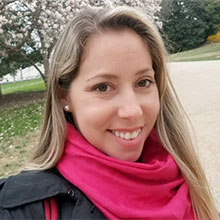
Project: Connecting the Dots
Project sponsor: Florida Physical Therapy Association
Project mentor: Nancy Kirsch, PT, DPT, PhD, FAPTA
What are you hoping to accomplish with this project?
I aim to create opportunities. I want early professionals to have a platform to explore presenting in front of large crowds, to network with seasoned leaders, and to potentially connect with a mentor. This project also connects the chapter leadership committee with new professionals interested in increasing involvement and education on how to blaze their own trail to leadership. At the same time, it gives our chapter a pool of possible presenters for our annual conference.
What drew you to this project?
The Florida Chapter has done an incredible job of embracing young new leaders. However, it is still challenging for our generation to forge a path within a chapter in which so many members are so active. Research also supports the mentor-mentee relationship, which is crucial in the development of new leaders; however, these relationships must be organic. This project aims to create better circumstances for these relationships to develop.
What surprises, challenges, or insights have you experienced along the way?
The biggest challenge was narrowing down the project to what it is now. I began with several ideas based on research of mentor-mentee relationships, yet I found out that many have already been attempted within the Florida Chapter with little to no success. The biggest insight was to hear the opinions of both the seasoned professionals and the early professionals on helping to create a bridge to connect both points of view about leadership development. I am hopeful that this project will enhance leadership development within the Florida chapter and complement their efforts.
Michelle Fogg, PT
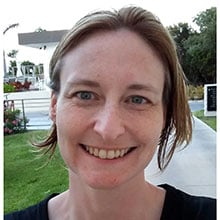
Project: Share Your Nest
Project sponsor: APTA Home Health
Project mentor: Daniel Dale, PT, DPT
What are you hoping to accomplish with this project?
This program will enable current PT students to live with local host families during their clinical experiences, and therefore offset the financial cost of PT school. I hope that having a program like this will encourage a more diverse applicant pool to consider the physical therapy profession and apply to PT schools. My ideal vision for the long term, if this pilot program is successful, is for Share Your Nest to have a website like Airbnb, where students and hosts can be more independent in matching themselves.
What drew you to this project?
Reviewing the demographics of the profession made me realize how it differs from the demographics of the United States. While poring over research articles examining this discrepancy in health care professions, I saw a common theme of financial barriers as one of the main deterrents for underrepresented minorities to pursue health careers. While many individuals may not be able to provide direct financial assistance for current students, I thought that some may have an extra room they could temporarily share with a student. I wanted to create a program that could facilitate matches between students and local individuals and families that would be rewarding to both parties.
What surprises, challenges, or insights have you experienced along the way?
I created a survey to assess interest among PT students in a housing program. Finding out how to optimally word the questions and responses was more time consuming than I could have imagined! I never realized how many people are involved in checking and re-checking verbiage before surveys are sent. I have also had some challenges finding placement for potential students, especially in more rural areas, and finding funding for a hold-harmless agreement that I developed with a lawyer. I can't believe how much I have already learned and how much more I will continue to learn as Share Your Nest continues to grow!
Emily French, SPT, MPH
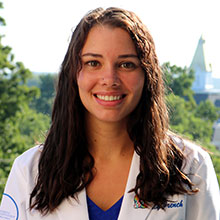
Project: Inclusive recruitment and retention for the promotion of a diverse physical therapy student population
Project sponsor: APTA Academy of Research
Project mentor: Mary Sinnott, PT, DPT, MEd
What are you hoping to accomplish with this project?
My goal is to identify ways that physical therapy programs across the country are recruiting and supporting students from historically underrepresented groups in health care. Many programs are putting together initiatives to increase racial and ethnic diversity, which is far past due, but I also want to hear from people in the LGBTQ+ community, people with disabilities, and people from all religions on how they felt supported (or not) during PT school.
What drew you to this project?
When I think of the people in my life who have wildly different backgrounds, cultures, and experiences, I want to make sure that they can see themselves in the profession. I hope one day everyone in the country has a PT, the same way they have a family physician or dentist. But even more than that, I hope that everyone can easily find a PT that they feel represented by and comfortable with.
What surprises, challenges, or insights have you experienced along the way?
My biggest challenge has been recruiting participants to interview, but the interviews I have conducted have all been insightful in different ways. I am pleasantly surprised by the openness and vulnerability that everyone I have spoken to has shown. The best part of this project so far is seeing the diversity in young physical therapists and students, and knowing that the future of the profession is going to look different than it has in the past.
Kacey Kline, PTA, BS
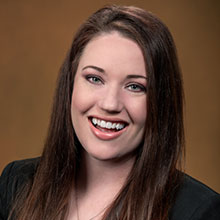
Project: Arizona PTAs' Reason for Non-Membership in APTA
Project sponsor: APTA Arizona
Project mentor: Barbara Sanders, PT, PhD, FAPTA
What are you hoping to accomplish with this project?
I'm hoping to increase PTA membership in APTA Arizona and to encourage PTA members to be more active in our chapter and the association.
What drew you to this project?
Working with my sponsoring chapter, we saw that our PTA representation in APTA Arizona was quite low, so the goal is to survey all of the nonmembers to discover the reasons behind it. Then we can work toward increasing membership based on the response. For example, if a PTA finds that the cost of membership is too high for the value, then are there ways that APTA Arizona could sponsor a membership?
What surprises, challenges, or insights have you experienced along the way?
One of the challenges I have found with this project is creating a validated survey to present to the license/certificate holders. I've also loved getting to learn more about APTA's mission and vision for the next 100 years and the leadership styles that APTA represents. It's great to understand what the focus of the association is and how I'm able to further contribute toward the goals.
Na-hyeon "Hannah" Ko, PT, DPT, PhD
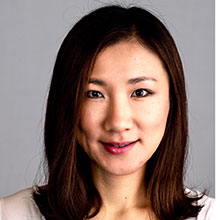
Project: To promote physical therapy services for children (0-3 years) who reside in remote areas in the Central Valley of California via Teletherapy
Project sponsor: California Physical Therapy Association
Project mentor: Aaron Embry, PT, DPT, PhD
What are you hoping to accomplish with this project?
I hope to find ways to promote physical therapy access to children who live in remote areas of the Central Valley, in California, using teletherapy. The purpose of this project is to identify if there is a need for infants and toddlers for physical therapy, especially for those who live in rural areas in the Central Valley. If there is a great need, how can we help them? My proposal seemed super ambitious, and it may take longer than a year. However, I believe what's important is that we are aware of health care disparities in rural areas and try to reduce this gap. I hope this project can increase awareness and get more support to make needed changes.
What drew you to this project?
Since I moved to Fresno three years ago for my faculty position at California State University-Fresno, people have told me we did not have enough pediatric PTs here in the valley. I heard there was a long waitlist for early-intervention PT services, and children were very sick but not getting immediate care that they needed. Studies on telehealth have shown positive outcomes — so why not promote this for children who need physical therapy but cannot access it because of their residing locations? When I received an email about the APTA Centennial Scholar Program, I thought this would give me an opportunity to initiate the project. And it did!
What surprises, challenges, or insights have you experienced along the way?
The greatest surprise that I had was the support from the Central Valley community. The director of case management services of the Central Valley Regional Center has been extremely helpful — her insights helped refine my survey questions. She even invited me to their training session to talk about this project and distribute the survey to service coordinators. I also had great support from the local pediatric PT and my students who are now pediatric PTs in town. My mentors from the California Physical Therapy Association and APTA kept me on track and provided me support and resources.
James "Mitch" Lane, PT, DPT
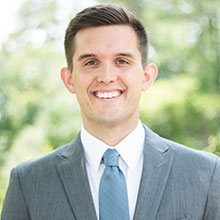
Project: Increasing APTA member involvement in holding public office positions
Project sponsor: APTA Board of Directors
Project mentor: Michael Gans, PT, DPT
What are you hoping to accomplish with this project?
I'm hoping to develop the framework for a program that will successfully increase awareness of how PTs, PTAs, and students are able to get more involved in local, state, or national government. In addition to increasing awareness, this program would ideally provide interested members the tools required to successfully attain public office positions ranging from local to national offices.
What drew you to this project?
Our patients and society need passionate health care providers to advocate for their health. Imagine if the very people creating and voting on legislation were members of the physical therapy profession! "Transforming society by optimizing movement to improve the human experience" is the APTA vision statement. Passionate members of APTA can have a massive impact on society if provided the opportunity to help shape our political environment.
What surprises, challenges, or insights have you experienced along the way?
Being an APTA Centennial Scholar has provided me insight on the challenges of project management and building complex projects from scratch. However, with each challenge presented, I have been swiftly assisted by APTA staff and members from across the nation. The membership of APTA is expansive, passionate, and ready to provide a helping hand to their colleagues. Each time I dig into a new aspect of the project, I meet new PTs, PTAs, or students who have unique experiences and insight.
Teoma Loeb, PT, DPT, MDiv
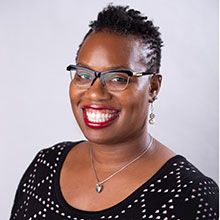
Project: Faith and Health: Community Empowerment via collaboration With the Black Church
Project Sponsor: American Academy of Physical Therapy
Project Mentor: Aaron Embry, PT, DPT, PhD
What are you hoping to accomplish with this project?
I am hoping to initiate collaboration for community wellness between physical therapists and local churches in the San Francisco Bay area and create a model that can be implemented in other areas as well. The Black church has given so much to me, has groomed me, has educated me, has taught me my cultural history, has been a place of spiritual grounding, and has allowed me to work and gain skills in ways I haven't been able to out in the "real world." I want to continue the engagement that the Black church has established. We have the phrase "if not for the women," because Black women make up over 85% of the Black church and do the majority of the work. I am one of those women and stand on the shoulders of my mother, grandmother, and many others who have come before me, and plan to continue the work in my own way.
What drew you to this project?
I feel like this project is a continuation and progression of my work. My very first capstone at Howard University, when completing my master's in physical therapy, involved health promotion within the church. Also, in seminary, I got a chance to explore this more by concentrating in faith and health, and developing a plan for community collaboration. This project is giving me the opportunity to implement that plan.
What surprises, challenges, or insights have you experienced along the way?
You really have to be committed! No one is forcing you to do the work. There is no grade attached to completion of the work, no points docked if you miss deadlines, and no one's looking over your shoulder making sure your action steps are being accomplished. It's the passion, desire, and drive that causes the work to be done. I am also realizing more and more the value of having, and building, community relationships, as the most success I've had in this project has been with the people and churches with whom I have the best relationships.
Camille Powell, PT, DPT
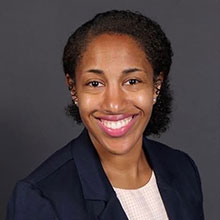
Project: Health Literacy: Assessing a Physical Therapist's Approach and Community Education in Historically Marginalized Communities
Project sponsor: APTA Massachusetts
Project mentor: Laurita Hack, PT, DPT, PhD, MBA, FAPTA
What are you hoping to accomplish with this project?
I have two goals for this project. First, I am working on developing a seminar for physical therapists to assess how we approach health literacy in historically marginalized communities as well as establish strategies to optimize the care that we provide to improve patient participation in these communities. Second, I am developing a community educational presentation to be delivered at an adult learning program that primarily serves a community that includes many who identify as being a part of a historically marginalized group. This presentation will address health literacy related to navigating the American health care system, with the goal of improving individuals' confidence in the ability to access health care and actively participate in the management of their own health.
What drew you to this project?
As a health care provider of color as well as a first-generation American, I have had the opportunity to see health care disparities from both a personal and provider perspective. My personal background has allowed me to connect with my patients and recognize that a common theme was poor health literacy. I hope that my project will be a starting point, possibly developing into a series of community educational classes, so that more community members can have increased confidence in accessing health care and making important medical decisions.
What surprises, challenges, or insights have you experienced along the way?
The biggest challenge that I faced early on was realizing how difficult it was to develop a community contact that would be interested in hosting my education presentation. Especially during a pandemic, the focus of many community organizations was not about starting something new but sustainability and survival during hard times, which I understood. Thankfully, with the help of my physical therapy community I was put in contact with the Jamaica Plains Adult Learning Program, located right outside of Boston. I have also learned that a great idea and passion is a good start, but having an attainable goal will help narrow your focus in order to actually produce an effective product. This one-year journey as a Centennial Scholar could find its completion in 2021; however, I hope not: I hope to develop additional goals from my original idea and continue to expand on this project.
Valerie Rucker, PT, DPT
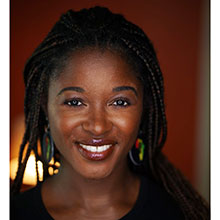
Project: Physical Rehab Exposure Program
Project sponsor: APTA District of Columbia
Project mentor: Terry Nordstrom, PT, EdD, FAPTA
What are you hoping to accomplish with this project?
I am hoping to increase exposure to and awareness of our profession among high school students in two high schools in the D.C. area. My team of work group participants and I seek to share the vast scope of our PT practice in order to encourage high school students to enter college with physical therapy in mind. We would like to facilitate mentor-mentee relationships between the high schoolers and PTs or PTAs, who we hope will give the students encouragement and self-efficacy in fulfilling a career in physical therapy. In addition, we will develop a summer internship program for college prep skills, professional development skills, introductions to health equity, and clinic observations.
What drew you to this project?
At the time this project idea was created, I had recently learned about the percentages of non-white physical therapists and physical therapist assistants. The number shocked me, to say the least. I feel that this lack of representation is not reflective of the country's demographics and that it serves as a barrier to care due to lack of awareness of our profession, lack of knowledge of what we do, and lack of physical clinics in underresourced communities. My colleague, Polo Edwards, PT, DPT, and I shared the same vision of having proportional representation within our profession to that of the country, and began developing what is now the Physical Rehab Exposure Program, also known as the APTA DC Pipeline Project.
What surprises, challenges, or insights have you experienced along the way?
I have been pleasantly surprised by the number of volunteers who have offered to help by joining the work group, volunteering to help out in the schools, becoming mentors, and committing to speaking on behalf of the profession. The challenging part is co-leading a group of individuals for such a large and robust project, which is why I am grateful to be an APTA Centennial Scholar. The Centennial Scholars program has provided tools for me to grow my leadership and project management skills and connected me with driven and passionate professionals in the field. It's already been such an amazing and humbling journey through this program and the development of PREP, and I am excited to see where it goes from here.
Dhara Shah, PT, DPT
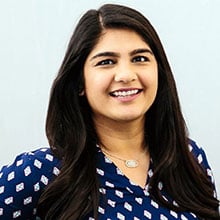
Project: Barriers to Pursuing the Physical Therapy Profession in Underrepresented Groups
Project sponsor: APTA Georgia and RM Barney Poole Leadership Academy
Project mentor: Julie Fritz, PT, PhD, FAPTA
What are you hoping to accomplish with this project?
I hope to obtain data from college students interested in health care professions. My goal is to understand why students interested in health care careers are not choosing physical therapy in the state of Georgia.
What drew you to this project?
I have noticed in my own family that my siblings and cousins have become optometrists, pharmacists, or physicians. I could not convince them to choose physical therapy. There is an obvious lack of diversity in the profession, but I believe the problem starts in the lack of diversity in physical therapy program applicants. I want to gain actual data from underrepresented groups to see if there is a common theme related to why physical therapy programs do not receive a more diverse pool of applicants.
What surprises, challenges, or insights have you experienced along the way?
I did not realize how difficult it was for a full-time clinician to have access to an Institutional Review Board. I have been connected with some colleagues at the University of North Georgia that are helping me, but the process it took to even make it possible to get IRB access was more difficult than expected. Also, being a full-time clinician while conducting a project is hard! It has made me realize that as a profession we need to better support clinicians who want to have a hand in research.
David Ung, SPT
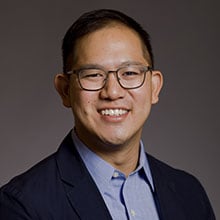
Project: Celebrating PT Culture: A Video Project
Project sponsor: APTA Student Assembly Board of Directors
Project mentor: Ryan Balmes, PT, DPT
What are you hoping to accomplish with this project?
My dream is to bring the physical therapy community together behind a common set of beliefs and core values — something I affectionately refer to as PT culture. I hope to accomplish that by telling the stories of remarkable people in our profession and sharing them via video. I believe there is much more that brings us together than separates us, and when we focus on what brings us together we are stronger than we can ever hope to be apart.
What drew you to this project?
I love the profession of physical therapy because of the opportunity we have to make an incredible impact on people's lives. I believe that passion and desire to make a life-changing impact in our patients' lives is at the core of our PT culture. When I saw an opportunity to deepen my understanding of the individual perspectives that add color and shape to our PT culture I immediately felt called to work on this project. The opportunity to capture that and then share these insights with our community only added to the excitement.
What surprises, challenges, or insights have you experienced along the way?
The greatest challenge has been managing resources (time, video equipment, editing knowledge, etc.) and deciding on necessary constraints to create a project I can share without compromising the vision. It has also been challenging to decide which amazing individuals to focus on for this project.